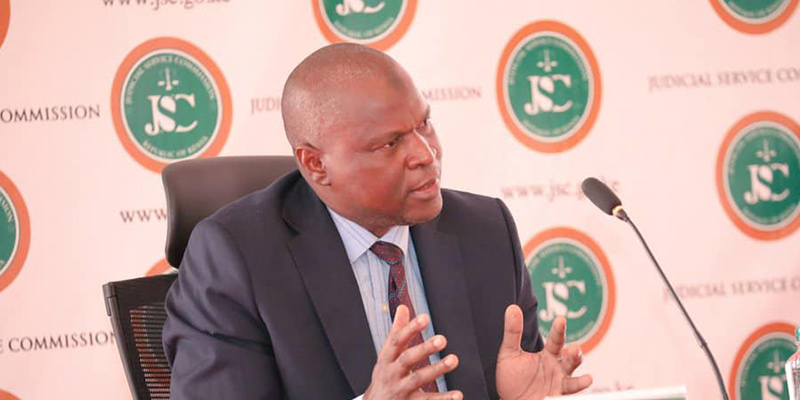Justice Said Juma Chitembwe, 54, shot to global infamy in 2017 when he was awarded the Golden Bludgeon for the worst judgment in the world.
In acquitting 24-year-old Martin Charo, in April 2016, Judge Chitembwe argued that the offence of defilement should not be limited to age and penetration. “If those were to be taken as conclusive proof of defilement, then young girls would freely engage in sex and then opt to report to the police whenever they disagree with their boyfriends.
“Where the child behaves like an adult and willingly sneaks into men’s houses for purposes of having sex, the court ought to treat such a child as a grownup who knows what she is doing. The appellant was 23 years old when the incident occurred . . . It would be unfair to have the appellant serve 20 years behind bars yet [the complainant] was after sex from him,” the Judge wrote in his judgment before acquitting Charo and setting him free.
Women’s Link Worldwide criticised the decision, saying it set a dangerous precedent by assuming that girls who consent to sex before they are 18 years old do not deserve protection from the law.
Scholars have roundly criticised the decision as clawing back the protections that the constitution and the law extends to children, but have not appealed further. Dr Luis Franceschi, former dean at Strathmore University Law School, observed: “It appears that the learned trial judge treats the crime of defilement in the same light as that of rape . . . Indeed, consent or its absence, is only a necessary element when an offence of rape is alleged. Not so for defilement.”
He further argued that consent and enjoyment were not synonymous; that they do not mean the same thing, as the judgment seemed to imply.
Justice Chitembwe’s controversial 25 April 2016 judgment is not on the list of the five sample writings he supplied to the Judicial Service Commission in applying to become Chief Justice, or in the alternate, to join the Supreme Court. He has instead supplied an October 2015 judgment allowing the prosecution of parents who arranged a child marriage, and a November 2016 decision denying a petition to throw out a sexual assault case on the grounds that the magistrate allowed the accused to remain out of the complainant’s view during cross-examination.
In another decision, Justice Chitembwe allowed two artists to be exempted from the collective management of their royalties on Skiza Tunes, noting: “Section 30A of the Copyright Act is unconstitutional as it was enacted without public participation and it is being retrospectively applied. It also limits artists’ freedom not to be compelled to join an association of any kind as provided under Article 36 of the Constitution. The petitioners are being forced to receive their royalties through Collective Management Organization yet they have no dealings with them. This is unconstitutional.”
Justice Chitembwe’s mixed bag of jurisprudence also includes his decision to dismiss the challenge to the election of the Marsabit governor in February 2018. It also offers a rare glimpse into his temperament in his ruling on an application to withdraw himself from an election petition appeal in 2013. The lawyer had claimed that when she appeared before Judge Chitembwe and informed him of an application to strike out the appeal, he raised his voice and ordered her to sit down, and then went ahead to dismiss the matter.
“When the court told [counsel] to sit down, it was only exercising its power to control proceedings in court. If the court is to allow counsels [sic] or their parties to conduct the proceedings in the manner they want then there will be no order in court. Counsel was not shouted at as alleged. It is true that counsel was told to sit down and wait, which she complied.”
Justice Chitembwe is no stranger to controversy. In December 2009, anti-corruption detectives arrested the judge over a Sh1.37 billion ($13.3 million) fraud allegation and abuse of office claims arising from his tenure as corporation secretary at the National Social Security Fund. He was acquitted three years later, along with former NSSF managing trustee Rachel Lumbasyo, when the court ruled that neither of them had a case to answer.
After returning to the bench, Justice Chitembwe barred then Interior Minister Joseph Nkaissery and then Inspector-General of Police Joseph Boinnet from deporting Italian tycoon Mario Mele to Rome, where he was wanted for tax evasion. Mele was among three Italians arrested during an anti-narcotics operation in Mombasa and Kwale in 2017. He was later deported.
A graduate of the University of Nairobi, Justice Chitembwe practised law for several years as an advocate of the High Court in Mombasa before working as company secretary for a chemical firm and later taking up the NSSF job.
He was appointed judge in 2009. He holds master’s degree in law from the University of Essex, an executive Master of Business Administration from Moi University and is enrolled in the doctoral degree programme in peace and conflict studies at Masinde Muliro University of Science & Technology.
Justice Chitembwe has served as judge in Kakamega, Malindi, Marsabit and Migori, and is currently stationed at the Civil Division of the High Court in Nairobi.
Justice Chitembwe received a rap on the knuckles in December 2014 when three appellate judges barred him from determining the disputed possession of a petrol station in a case filed by two oil companies. Justices Erastus Githinji, William Ouko and Kathurima M’Inoti ruled that the case between Total and Vivo Energy “in Kakamega be heard and determined by a judge other than Justice Chitembwe”.
“The conclusion at that stage that Mr Maloba’s conduct was fraudulent, is even more baffling to us. The judge was not justified in making such findings at that stage,” they said in the ruling.
Last year, the Judicial Service Commission received a misconduct complaint against Justice Chitembwe regarding a land case he presided over in Malindi. Tsangawa Ngawa Chome filed the complaint but the commission did not recommend that a tribunal investigate Justice Chitembwe.
Justice Chitembwe’s strongest suit will be that he is the only contender from the coastal region seeking a senior position in the judiciary.
–
Back to: Kenya Chooses Its Next Chief Justice








